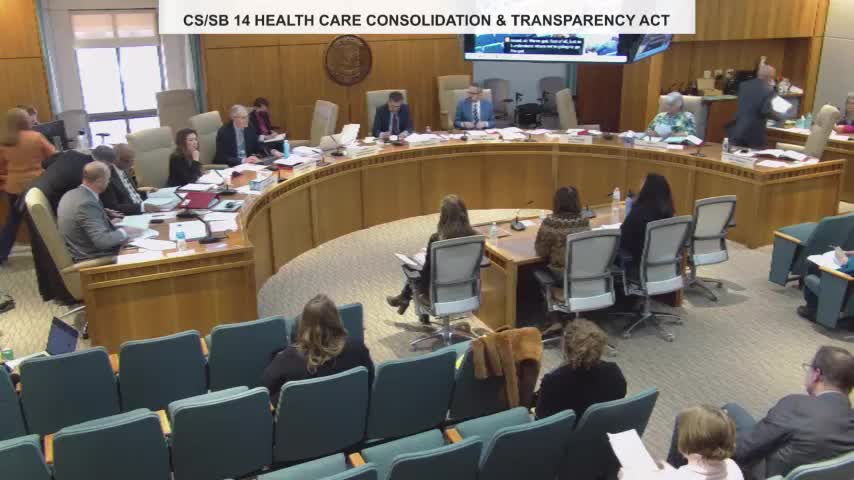Lawmakers split over oversight of hospital acquisitions; committee fails to advance bill
Get AI-powered insights, summaries, and transcripts
Subscribe
Summary
Senate Bill 14, a measure to expand state review of hospital and health-care acquisitions, drew lengthy testimony from hospitals, providers and patient advocates and failed a committee due‑pass motion after amendments and debate.
Senators debated a proposal, Senate Bill 14, that would expand state oversight of certain hospital and health-care transactions, giving the state superintendent of insurance authority to review and impose conditions on sales or acquisitions that threaten availability, accessibility, affordability or quality of care.
The bill’s sponsor, Senator Duhigg, said lawmakers drafted the measure after a statewide stakeholder outreach process and examples around the country showing that some acquisitions by private equity and out‑of‑state firms led to higher prices and reduced services. "When these companies acquire health care here in New Mexico, what tends to happen is that prices go up, quality goes down," Duhigg told the committee.
Nut graf: proponents argued the measure would protect rural hospitals and patients from consolidation that can reduce services; hospitals and provider groups said the bill is vague, lacks confidentiality protections and could chill investment.
Proponents including the League of Women Voters and the New Mexico Center on Law and Poverty said the bill balances transparency with confidentiality and would allow state review when needed to protect care in vulnerable communities. "Senate Bill 14 provides oversight for the consolidation of health care facilities to minimize that threat to the health of New Mexico," said Richard Mason, League of Women Voters (written testimony read in the hearing).
Hospital groups and provider associations testified in opposition, citing uncertain timelines, broad definitions that could sweep in independent providers and insufficient protections for proprietary information. "There are significant issues for hospitals and for Presbyterian in particular," said Julia Ritten, senior director of government affairs for the New Mexico Hospital Association, urging a no vote on the substitute version because of vague standards and lengthy post‑transaction oversight.
Superintendent of Insurance and witness testimony described a multi-stage review process: an initial informal meeting to determine applicability, a preliminary review for straightforward cases and a comprehensive review for transactions that raise red flags. The superintendent said experts would be engaged when needed and paid by the parties, similar to processes under the state's Insurance Holding Company Act.
Committee action and amendments: lawmakers adopted several amendments narrowing or clarifying language, then moved a committee substitute to the judiciary committee. A due‑pass motion on the judiciary committee substitute failed in roll-call; the transcript records the committee chair announcing "No. The due pass motion fails." The committee ultimately rolled the bill over for further consideration.
Ending: Supporters said the bill is a measured response to consolidation; opponents said the measure remains too broad and legally uncertain. The committee did not advance the bill after the failed due‑pass vote, and sponsors and stakeholders indicated continued negotiation could follow.
